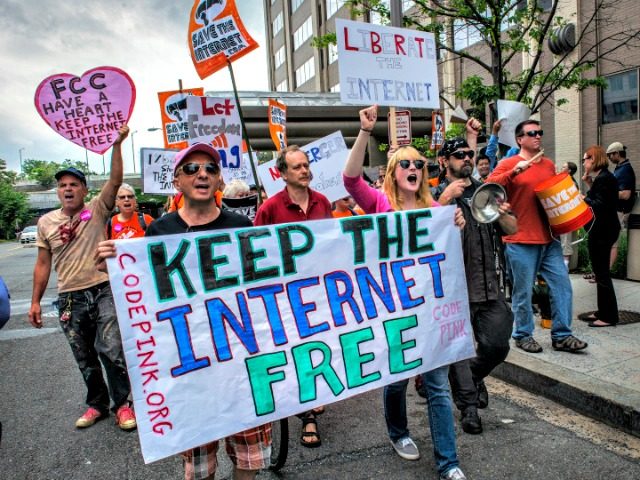Millions of Americans cheered the Federal Communications Commission’s (FCC) proposed repeal of net neutrality, while others remain concerned about the repeal’s effect on the future freedom of the Internet.
Here’s what you need to know about net neutrality:
1. In 1996, President Bill Clinton and a Republican Congress passed the 1996 Telecommunications Act, which established a bipartisan, light-touch regulatory system of Internet. The ’96 Telecom Act established the Internet as an “information service.”
2. Net neutrality passed under former Democrat FCC Chairman Tom Wheeler in 2015. The rule, known as the Open Internet Order, reclassified the internet as a public monopoly. Critics chided the rule, stating that it would diminish the freedom of the Internet. Proponents argue that the regulations prevent Internet service providers (ISPs) from discriminating against content providers.
3. Net neutrality would mandate that ISPs treat internet traffic the same, however, scholars have argued that Internet traffic such as a high-resolution Netflix stream and an emails should not be treated equally. TechFreedom contends that prioritizing Skype sessions and high-resolution Netflix streams would ensure that there would remain no interruptions in service and actually free up Internet congestion.
4. Former FCC Chairman Tom Wheeler refused to released his proposed net neutrality regulations ahead of the agency’s vote. In contrast, current Chairman Ajit Pai released his proposed “Restoring Internet Freedom” order ahead of the agency’s vote to repeal net neutrality.
5. Robert McChesney, a founder of Free Press, once said, “In the end, there is no real answer but to remove brick by brick the capitalist system itself, rebuilding the entire society on socialist principles.” McChesney was cited 46 times in the net neutrality order.
6. Multiple tech news outlets cheered millions of pro-net neutrality comments filed through the FCC’s comment system, however, a Broadband for America report found that once they accounted for fake email domains and unverifiable international comments, 69 percent of those who filed through the FCC’s comment system favored repealing net neutrality.
7. Many pro-net neutrality activists warn that if net neutrality were repealed, then ISPs could have free rein to block whatever content they deem objectionable. However, many liberal tech companies such as GoDaddy, Google, and Cloudflare, under current net neutrality rules, blocked the white nationalist website The Daily Stormer from their web hosting. Google also removed Gab.ai, a content-neutral platform committed to free speech for everyone, from their Google Play app ecosystem for promoting “hate speech.”
8. The FCC’s chief economist joked in 2015 that the net neutrality order was an “economics-free zone,” arguing that the FCC did not include a traditional cost-benefit analysis in its net neutrality order.
9. Net neutrality advocates warn that without net neutrality, telecommunications providers might unfairly prefer some content over others. However, net neutrality would prevent “free data” programs such as T-Mobile’s Binge On program that allows users to use Netflix, Spotify, and Apple Music without counting towards their data limit.
10. Congresswoman Marsha Blackburn (R-TN) told Breitbart News that repealing net neutrality will spur more broadband investment in rural America. Blackburn said that the rural broadband is the “infrastructure issue of this decade.”
11. FCC Chairman Pai unveiled his proposed “Restoring Internet Freedom Order” that will repeal the agency’s net neutrality regulation; the agency will vote on the measure in December.
12. Chairman Pai once said that the internet prospered before net neutrality was enacted. Pai said, “The internet is the greatest free-market success in American history.”

COMMENTS
Please let us know if you're having issues with commenting.